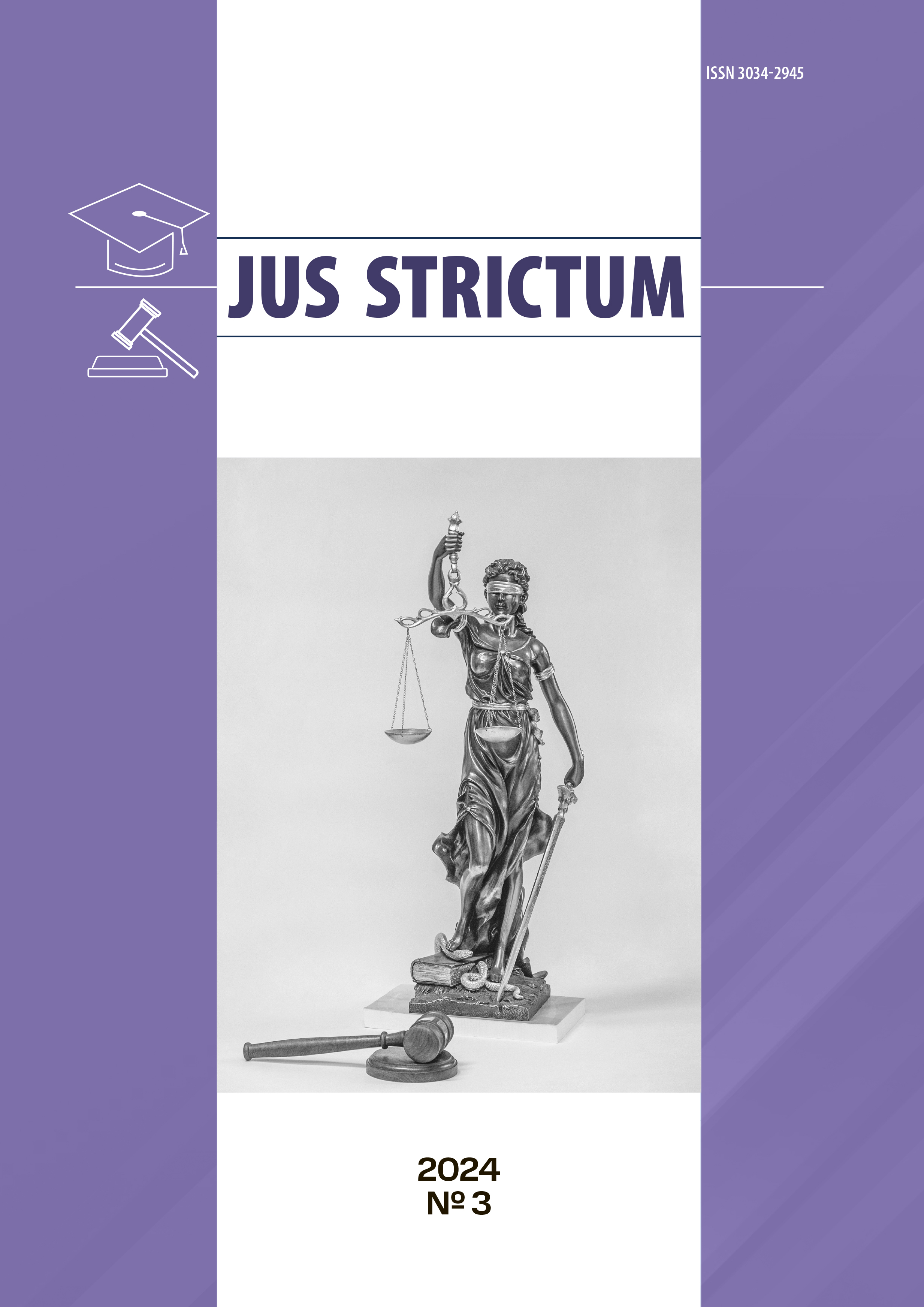Развитие советских уголовно-правовых запретов в период Великой Отечественной войны
- Авторы: Скоробогатов А.В.1, Рыбушкин Н.Н.1
-
Учреждения:
- Казанский инновационный университет имени В.Г. Тимирясова (ИЭУП)
- Выпуск: № 3 (2024)
- Страницы: 20-26
- Раздел: Статьи
- URL: https://vektornaukipravo.ru/jour/article/view/649
- DOI: https://doi.org/10.18323/3034-2945-2024-3-58-3
- ID: 649
Цитировать
Полный текст
Аннотация
Статья посвящена исследованию уголовно-правового регулирования в период Великой Отечественной войны в историко-правовом контексте. Целью работы является формирование научно обоснованного знания об особенностях развития системы уголовно-правовых запретов в советском праве в период Великой Отечественной войны. На основе конструктивистской парадигмы авторы исследуют процесс трансформации уголовно-правовых запретов в военное время, выделив в этом процессе роль не только законодательных, но также исполнительных и судебных органов. Проведенное исследование позволило сделать вывод, что трансформация уголовно-правового регулирования в равной мере коснулась общей и особенной частей данной отрасли права. Однако изменения были вызваны не только потребностями военного положения, но и трансформацией уголовного права накануне войны, связанной с провозглашенным Конституцией СССР 1936 г. переходом к регулированию этой отрасли права не на республиканском, а на общесоюзном уровне. В правовой доктрине и общей части уголовного права изменения касались прежде всего криминализации гражданских и трудовых отношений, расширения пределов уголовно-правового регулирования, в частности появления новых объектов уголовно-правовой охраны, и уточнения перечня специальных субъектов уголовного права, для которых устанавливались повышенные меры уголовной ответственности. Применительно к особенной части уголовного права изменения носили более конкретизированный характер, обусловленный необходимостью мобилизации всех материальных и людских ресурсов для разгрома врага и обеспечения правопорядка и общественной безопасности.
Об авторах
Андрей Валерьевич Скоробогатов
Казанский инновационный университет имени В.Г. Тимирясова (ИЭУП)
Email: skorobogatov@ieml.ru
ORCID iD: 0000-0001-9139-5367
доктор исторических наук, доцент, профессор кафедры теории государства и права и публично-правовых дисциплин
Россия, 420111, г. Казань, ул. Московская, 42Николай Николаевич Рыбушкин
Казанский инновационный университет имени В.Г. Тимирясова (ИЭУП)
Автор, ответственный за переписку.
Email: rybushkin@ieml.ru
ORCID iD: 0000-0002-4878-724X
кандидат юридических наук, доцент, профессор кафедры теории государства и права и публично-правовых дисциплин
Россия, 420111, г. Казань, ул. Московская, 42Список литературы
- Скоробогатов А.В., Краснов А.В. Правовая реальность транзитивного общества: дискурс и нарратив. СПб.: Алетейя, 2024. 552 с.
- Арямов А.А. Византизм в генезисе отечественного уголовного права // Вестник Казанского юридического института МВД России. 2023. Т. 14. № 1. С. 8–14. EDN: WLQLXR.
- Маркунцов С.А. Исторические особенности возникновения первичных уголовно-правовых запретов // Журнал российского права. 2014. № 1. С. 132–142. doi: 10.12737/1825.
- Скоробогатов А.В., Рыбушкин Н.Н. Уголовно-правовые запреты в советском юридическом дискурсе // Актуальные проблемы экономики и права. 2014. № 2. С. 120–128. EDN: SERCML.
- История советского уголовного права (1917–1947) / науч. ред. А.А. Герцензон. М.: Юриздат, 1948. 465 с.
- Рогалева Н.В. Уголовно-правовая политика Советского государства в годы Великой Отечественной войны // Вестник Кузбасского института. 2011. № 2. С. 4–8. EDN: RWJROF.
- Шелегов Ю.В. Уголовная политика СССР в годы Великой Отечественной войны // Научный дайджест Восточно-Сибирского института МВД России. 2020. № 6. С. 239–244. EDN: KAQGJG.
- Епифанова Е.В. Изменения в уголовном законодательстве в период Второй мировой войны // Очерки новейшей камералистики. 2020. № 1. С. 26-31. EDN: BNJBMC.
- Звонарев А.В., Пашенцев Д.А. Чрезвычайное законодательство как средство регулирования общественных отношений в первый месяц Великой Отечественной войны // Образование и право. 2020. № 5. С. 342–348. EDN: GHPPTS.
- Блинова В.В. Борьба со спекуляцией в годы Великой Отечественной войны (историко-правовой анализ) // Образование. Наука. Научные кадры. 2019. № 3. С. 19–22. doi: 10.24411/2073-3305-2019-10122.
- Ермолович Я.Н. Развитие военно-уголовного законодательства в период Великой Отечественной войны (1941–1945 гг.) // Военно-исторический журнал. 2020. № 12. С. 13–17. EDN: BVZQES.
- Berman H.J. Principles of Soviet Criminal Law // The Yale Law Journal. 1947. Vol. 56. № 5. P. 803–836. doi: 10.2307/792959.
- Adams W. Capital punishment in imperial and Soviet criminal law // American Journal of Comparative Law. 1970. Vol. 18. P. 575–594.
- Solomon P.H. Criminalization and Decriminalization in Soviet Criminal Policy, 1917–1941 // Law & Society Review. 1981. Vol. 16. № 1. P. 9–43. doi: 10.2307/3053548.
- Лелеков В.А., Бородин А.Д. Уголовно-правовая политика СССР в предвоенные, военные и послевоенные годы (1935–1960 гг.) // Вестник Воронежского института ФСИН России. 2020. № 2. С. 194–200. EDN: BRHCLD.
- Starosolsky G.V. Basic Principles of Soviet Criminal Law // North Carolina Law Review. 1950. Vol. 28. № 4. P. 359–374.
- Крашенинников П.В. Заповеди советского права: Очерки о государстве и праве военного и послевоенного времени. 1939–1961. М.: Статут, 2019. 376 c.
- Шахбазян С.В. Генезис законодательного определения преступления и категории преступлений по российскому уголовному законодательству // Юридические исследования. 2020. № 5. С. 35–62. doi: 10.25136/2409-7136.2020.5.28845.
- Романов Р.Е. Советское государство и рабочие Сибири в годы Второй мировой войны: принудительная стратегия социально-трудовой коммуникации // Историко-экономические исследования. 2018. Т. 19. № 3. С. 303–329. doi: 10.17150/2308-2588.2018.19(3).303-329.
Дополнительные файлы







